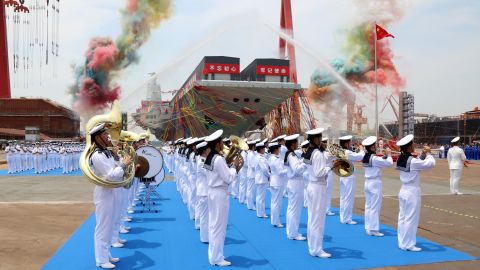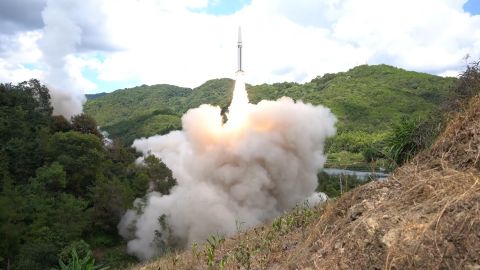[ad_1]
Editor’s Note: A version of this story appeared in CNN’s Meanwhile in China newsletter, a three-times-a-week update exploring what you need to know about the country’s rise and how it impacts the world. Sign up here.
Seoul, South Korea
CNN
—
It has taken just a handful of years for Chinese leader Xi Jinping to make good on his promise of transforming the People’s Liberation Army.
In 2015, three years after he assumed leadership of the Chinese Communist Party, Xi undertook a sweeping project to turn the PLA into a “world-class fighting force” that would be a peer to the US military.
The deadline he set for that milestone was 2049, yet just seven years on and he is already far along the path to realizing his dream.
China now boasts the world’s largest navy, with some of the newest and most powerful warships afloat; an air force with stealth fighter jets and a stealth bomber expected soon; and a rocket force bristling with new missiles that give it a reach unmatched in Asia.
But as Russia’s faltering invasion of Ukraine shows, even the largest, most formidable seeming militaries have Achilles heels that can be exploited by smaller, savvier forces.
What should be even more worrying for Xi, as he prepares to secure an expected third term as both party leader and supreme commander of the Chinese military at this week’s 20th Party Congress, is that many analysts see parallels between the problems dogging Moscow in Ukraine and the potential weak spots that remain in the PLA.
Xi has vowed to bring Taiwan, a self-governed island of 24 million people under Beijing’s control – by force if necessary.
He repeated that vow at the Party Congress on Sunday, with a speech that some analysts suggested conveyed a “newfound urgency” on the issue.
“The wheels of history are rolling on towards China’s reunification and the rejuvenation of the Chinese nation. Complete reunification of our country must be realized,” Xi told the Congress to thundering applause.
Taiwan lies fewer than 110 miles (177 kilometers) off the coast of China. For more than 70 years the two sides have been governed separately, but that hasn’t stopped China’s ruling Communist Party from claiming the island as its own – despite having never controlled it.
Xi’s speech was a summary of the Communist Party’s five yearly work report, the full text of which outlined an ambition for China to become more adept at deploying its military forces on a regular basis, and in diversified ways, to enable it to “win local wars.”
But while having the ability to take Taiwan has long been a driver of Xi’s modernization of the PLA, actually doing so is a gargantuan and bloody task – arguably even more so than Russia’s attempted invasion of its neighbor.
In invading Ukraine, Moscow had the advantage that its troops needed only to cross a land border.
Should China invade Taiwan, its troops would have to cross the Taiwan Strait.
Analysts say that would require hundreds of thousands of troops in what would be the largest amphibious operation since the Allies stormed ashore at Normandy in German-occupied France in World War II.
And many doubt that China – even with more naval assets than any other nation on the planet – can pull that off.
While the PLA Navy has been churning out ships – including a new aircraft carrier launched this year and numerous Type 055 destroyers, seen by some as the world’s most powerful surface ships – doing so has been expensive.
And as Phillips O’Brien, professor of strategic studies at the University of St. Andrews in Scotland, points out, Taiwan has a relatively cheap way of countering them – by investing in the sort of small, land-based anti-ship missiles that Ukraine has been using to great success against Russia.
China also faces a significant challenge in making sure all the different parts of its now formidable fighting forces pull in the same direction – another issue that has dogged Russia in Ukraine.
It is still in the early stages of creating unified command structures in which naval, air, army and rocket units work together seamlessly to execute a coordinated battle plan.
Xi’s work report on Sunday cited the need to “improve the command system for joint operations” and enhance the PLA’s “systems and capacity for reconnaissance and early warning, joint strikes, battlefield support, and integrated logistics support.”
Doing so is not easy, as Russia’s experience in Ukraine shows. There have been numerous accounts throughout the war of Russian troops lacking air cover, or the proper supplies, or deploying the right units in the right places to block a Ukrainian offensive.
Still, experts say China has made progress in this regard, noting the coordination of its military branches during exercises the PLA held in response to US House Speaker Nancy Pelosi’s visit to Taiwan in August.
In the days following the visit the PLA’s navy war-gamed a blockade of Taiwan, its rocket force sent missiles over the main island and its air force flew jets repeatedly into Taipei’s Air Defense Identification Zone.
And analysts note that under Xi, China has made a deliberate effort to put in place commanders who can execute such combined campaigns.

However, Xi is also about to lose to retirement some of the officers who spearheaded the coordinated post-Pelosi maneuvers.
Four of the top six officers of China’s Central Military Commission (CMC) have reached the normal retirement age of 68 and are being replaced as Xi heads into his third term, according to Joel Wuthnow, a senior research fellow at the Center for the Study of Chinese Military Affairs at the US National Defense University.
What’s more, the four departing officers were in charge of the PLA’s actual fighting forces, while the two remaining ones come from the military’s political ranks, Wuthnow wrote for the Jamestown Foundation’s China Brief last month.
“Barring a decision by Xi to overturn the age limits, it is likely that no one with operational expertise will remain on the new CMC,” Wuthnow wrote.
The question is, will these new leaders cooperate like their predecessors – or return to the interservice rivalries that plagued the PLA before Xi?
Operationally, these new leaders will be tasked with overseeing another aspect of the PLA’s operations that Xi wants to emphasize: what are known in the United States as “military operations other than war.”
Xi signed an order for new guidelines covering non-war operations in June, though it’s not clear what those operations refer to.
Analysts have warned that language could be a smokescreen for something more sinister – likening it to how Russian President Vladimir Putin refers to his invasion of Ukraine as a “special military operation.”

However, Chinese state media have done their best to play the order down, saying it could cover actions such as participating in international peacekeeping operations or providing disaster relief.
“The outlines aim to prevent and neutralize risks and challenges, handle emergencies, protect people and property, and safeguard national sovereignty, security and development interests, and world peace and regional stability,” the Xinhua news service reported.
Jonas Parello-Plesner, a senior fellow at the German Marshall Fund, is among those skeptical of the motives behind the non-war order.
He wrote in July that the new guidelines on non-war operations would be “a next step in bringing [China’s] military presence out into the world – and likely another step away from the peaceful rise it once promised to the global community.”
Xi may be well on the way to realizing his dream of a truly world-class Chinese military, but there remain myriad problems in his way.
And parallels to Putin’s military misadventures will be the last thing he wants to hear.
[ad_2]
Source link

